外研版英语八年级上册 Module 4 Unit 1 教材重要知识点梳理
外研版八年级上册Module 4 Unit1(共21张PPT)

eg:careful-most careful beautiful-most beautiful
(6)不规则变化
eg:good/well-best far-farthest/furthest many/much-most
Speaking
Try to express the means of transportation as many as you can.
What’s the … way to go to school?
Going by …is the ...
Exercise
用所给短语的适当形式完成句子。
be late for, except, by taxi, what about, so much
1. I know your mother goes to work by bike. _W__h_a_t_a_b_o_u_t_ your father? 2. Sorry, Mr Green. I got up late this morning so I _a_m__la_t_e_f_o_r class now. 3. Let’s go to the zoo __b_y_t_a_x_i _. It’s quick. 4. Don’t eat __so__m_u_c_h__ meat every day. It can make you fat. 5. All of my classmates went to the concert __e_xc_e_p_t___ me.
1. The __m_o_s_t_c_o_m__fo_r_t_ab_l_e__ way to go to school is by taxi. 2. Tony lives the ___fa_r_th_e_s_t__ from school. 3. Lingling’s home is the __c_l_o_s_es_t__ to school, so she always walks. 4. For Betty, going to school by bike is the __b_e_s_t_ choice.
外研版八年级英语上册 Module 4 知识归纳

Module 4.Planes,ships and trains一、主题:交通方式(Modes of transportation)二、必背单词名词:road 路:(尤指)公路accident 交通事故;意外事件choice 选择classmate 同班同学journey 旅行;旅程动词:book 预订park 停放(车);泊(车)形容词:crowded 拥挤的;人数过多的副词:however 然而;但是介词:except 除……之外兼类词:far adv.远;遥远adj.远的;遥远的close adj.(距离上)近的,接近的adv.(距离上)接近地outside prep.在……之外adv.在外面;朝户外n.外面;外部adj.外部的;外表的cost v.价钱为;花费n.价钱;成本;代价三、常用短语1、take the bus 乘公共汽车2、go to school 去上学3、by taxi 乘出租车4、what about…… ……怎么样5、by bike 骑自行车6、so much 如此多的7、far from 远离8、take the underground 乘地铁9、be close to 离………近10、the same as 和………一样11、ride one’s bike 骑自行车12、be careful 小心13、all the time 一直;不断地14、on one’s way to 在某人去……的路上15、from……to……… 从………到………16、how long 多长时间17、the best way to travel 旅行的最佳方式18、by train 乘火车19、by coach 乘长途汽车20、a long time 很长时间21、by car 乘小汽车22、by ship 乘轮船23、go across 穿越24、book tickets 预订票25、get crowded 变得拥挤26、because of 因为27、have a great trip 旅途愉快28、in a hurry 匆忙29、somewhere else 其他的某个地方30、thanks for…… 感谢………四、重点句型1、形容词、副词最高级句型(1)It’s the most comfortable way, but it’s also the most expensive. (2)He lives the farthest from school…2、谈论交通方式(1)----How does Tony go to school?----…H e takes the underground.(2)----And what abou t Lingling?----Her home is the closest to school, so she walks.(3)----How about Daming?----He goes by bus too……(4)You can ride your bike to school, but remember to be careful all the time.3、提建议的句型:Then what about going by bike?4、表示请求的句型:Could you please tell me about the trains and ships to get there?5、“It takes sb. some time to do sth”句型:And it takes you about twelve hours to get there.五、模块语法形容词、副词的最高级(It is the fastest and the second cheapest./ The new train travels the fastest of all the trains in the world.)Module 4.Planes,ships ans trains 详细笔记1、be late for…迟到eg. I was late for school/work. 我上学/工作迟到了。
Module 4 Unit 1 知识点详解-广西桂林市雁山中学外研版八年级上册英语

外研版英语八(上)Module 4 Plays, ships, and trains知识点详解Unit 1He lives the farthest from school.★(A3).【知识点再现】I was late for school today. 今天我上学迟到了。
『知识点1』be late for意为“迟到”。
late是形容词,意为“迟到的”如:We’ll be late for work. 我们上班要迟到了。
Tony was late for the meeting yesterday afternoon. 托尼昨天下午开会迟到了。
★(A3).【知识点再现】What happened? 发生了什么事?『知识点2』happen是不及物动词,它的用法常见的有如下几种情况:①表示“某地(某时)发生了什么事”,常用“sth.+ happen +地点/时间”这一结构来表达,此时主语应是事物。
如:The story happened in 2003. 这个故事发生在2003年。
An accident happened in that street. 那条街上发生了一起事故。
②表示“某人出了某事(常指不好的事)”,要用“sth.+ happen+to sb.”这一结构来表达。
提问时常用“What happen(s)/happened to sb.?”句型。
如:What happened to you? 你怎么啦?A car accident happened to her this morning. 今天上午她发生了交通事故。
③表示“某人碰巧做某事”,要用“sb.+ happen+ to do sth.”这一结构来表达。
如:I happened to meet a friend of mine in the street yesterday. 昨天我碰巧在街上遇到了我的一个朋友。
④happen表示“碰巧或恰巧发生某事”时,还可用“It happens / happened that...”这一结构来表达。
外研版英语八年级上册module 单元知识点归纳总结(详细版)
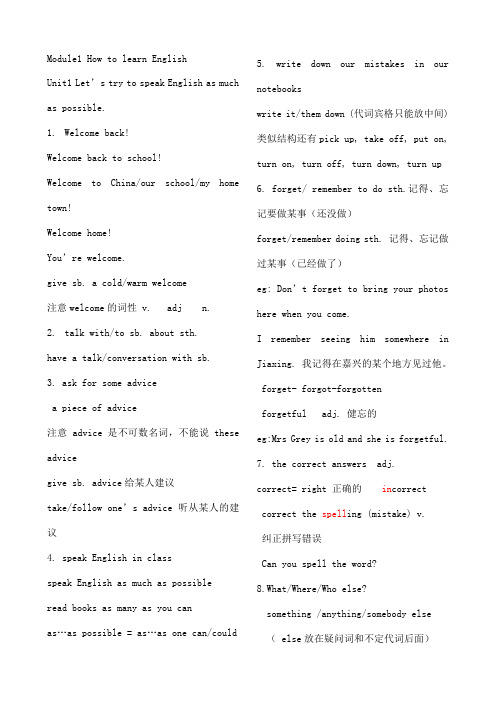
Module1 How to learn EnglishUnit1 Let’s try to speak English as much as possible.1.Welcome back!Welcome back to school! Welcome to China/our school/my home town!Welcome home!You’re welcome.give sb. a cold/warm welcome注意welcome的词性 v. adj n.2.talk with/to sb. about sth.have a talk/conversation with sb.3. ask for some advicea piece of advice注意advice是不可数名词,不能说these advicegive sb. advice给某人建议take/follow one’s advice听从某人的建议4. speak English in classspeak English as much as possible read books as many as you canas…as possible = as…as one can/could 5. write down our mistakes in our notebookswrite it/them down (代词宾格只能放中间) 类似结构还有pick up, take off, put on, turn on, turn off, turn down, turn up 6. forget/ remember to do sth.记得、忘记要做某事(还没做)forget/remember doing sth. 记得、忘记做过某事(已经做了)eg: Don’t forget to bring your photos here when you come.I remember seeing him somewhere in Jiaxing. 我记得在嘉兴的某个地方见过他。
外研版八年级英语上册Module 4 unit 1 He lives the farthest fr
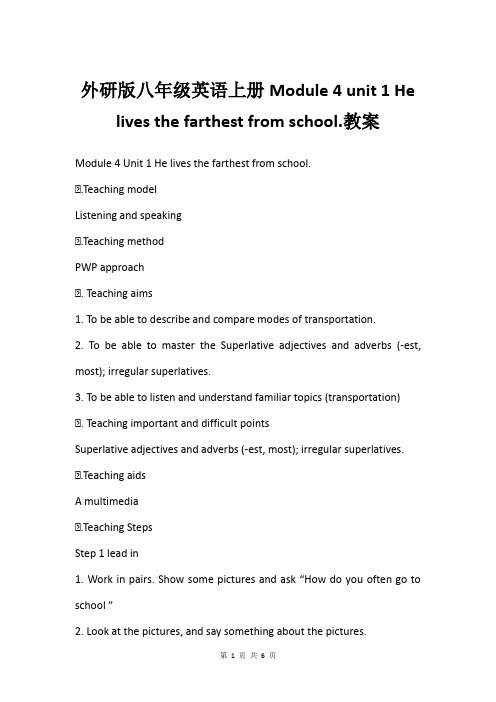
外研版八年级英语上册Module 4 unit 1 He lives the farthest from school.教案Module 4 Unit 1 He lives the farthest from school.Ⅰ.Teaching modelListening and speakingⅠ.Teaching methodPWP approachⅠ. Teaching aims1. To be able to describe and compare modes of transportation.2. To be able to master the Superlative adjectives and adverbs (-est, most); irregular superlatives.3. To be able to listen and understand familiar topics (transportation)Ⅰ. Teaching important and difficult pointsSuperlative adjectives and adverbs (-est, most); irregular superlatives.Ⅰ.Teaching aidsA multimediaⅠ.Teaching StepsStep 1 lead in1. Work in pairs. Show some pictures and ask “How do you often go to school ”2. Look at the pictures, and say something about the pictures.3. Introduce the new words.4. Learn the new words.5. Read the new words.Step 2 presentation and practice1. Ask the students to read the words in Activity 1.bus ship taxi train underground2. Look at the pictures in Activity 1 carefully.3. Now match the words with the pictures.5. Ask the students to check their answer with a partner.6. Call back the answer from the whole class and check the answer.Step 3 pre-listening1. Ask the students to read the words in Activity2.busy cheap expensive modern2. Play the recording and ask the students to listen to the recording carefully.3. Listen and match the words in the box with the pictures in Activity 1. You need to use one word more than once.4. Ask the students to check their answer with a partner.5. Call back the answer from the whole class and check the answer.Step 4 Listening and reading1. Show some pictures, and ask the students to talk about them.2. Ask the students to read the conversation silently.3. Play the recording and ask the students to listen and read the conversation.4. Read the conversation.5. Act it out.6. Learn “Everyday English”1) What happened2) Don’t worry.Step 5 Reading practice1. Ask the students to read the conversation again.2. Now complete the table.Betty Tony Lingling DamingWays to go to school3. Ask the students to check with a partner.4. Check the answers:Step 6 practice1. Ask the students to read the words in the box in Activity 4.close comfortable good far2. Read through the sentences.1) Lingling lives the ________ to school, so she always walks.2) The _________ way to go to school is by taxi.3) Tony lives the ___________ from school.4) For Betty, going to school by bike is the _________ choice.3. Complete the sentences with the correct words from the box.4. Ask the students to check with a partner.5. Check the answers:Step 7 Complete the sentences.1. Ask the students to read the words or expression in the box in Activity 5.crowded except modern road accident2. Read through the sentences.1) All the students take the bus to school ___________ Sam.2) The ___________ train in the world is the Shanghai airport train.3) I saw a(n) __________ on the way to school yesterday.4) I do not take the bus to school because it is usually very ___________.3. Complete the sentences with the correct words from the box.4. Ask the students to check with a partner.5. Check the answers:Step 8 speaking1. Play the recording once without stopping.2. Play the recording again and ask the whole class to repeat.1) —Who lives the closest to school— Lingling lives closest.2) — Whah is the most comfortable way to go to school for Betty— By taxi.3. Ask the students to listen and mark the intonation.4. Now listen again and repeat.Step 9 speaking practice1. Ask the students to read the words or expression in the box in Activity 7.2. Read through the example with the class.— What’s the most expensive way to go to school— Going by taxi is the most expensive.3. Work in pairs.Step 10 Important and difficult points1. Maybe I should go to school by taxi. 或许我应该坐出租车去上学。
外研版八年级英语上册知识点汇总
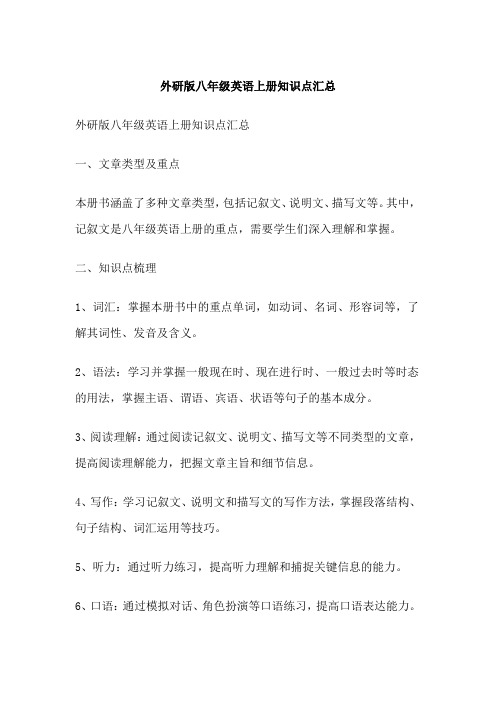
外研版八年级英语上册知识点汇总外研版八年级英语上册知识点汇总一、文章类型及重点本册书涵盖了多种文章类型,包括记叙文、说明文、描写文等。
其中,记叙文是八年级英语上册的重点,需要学生们深入理解和掌握。
二、知识点梳理1、词汇:掌握本册书中的重点单词,如动词、名词、形容词等,了解其词性、发音及含义。
2、语法:学习并掌握一般现在时、现在进行时、一般过去时等时态的用法,掌握主语、谓语、宾语、状语等句子的基本成分。
3、阅读理解:通过阅读记叙文、说明文、描写文等不同类型的文章,提高阅读理解能力,把握文章主旨和细节信息。
4、写作:学习记叙文、说明文和描写文的写作方法,掌握段落结构、句子结构、词汇运用等技巧。
5、听力:通过听力练习,提高听力理解和捕捉关键信息的能力。
6、口语:通过模拟对话、角色扮演等口语练习,提高口语表达能力。
三、知识点延伸1、动词时态:通过实例对比一般现在时和现在进行时的区别,了解不同时态的表达方式和运用场景。
2、状语从句:掌握时间状语从句、条件状语从句等不同类型的状语从句,了解其在句子中的作用和用法。
3、现在完成时:学习现在完成时的基本用法,掌握已完成动作对现在的影响。
4、主谓一致:理解主谓一致的概念,掌握不同类型的主语与谓语动词的搭配规则。
四、文章结构分析1、开头段:简述文章主题,引起读者兴趣。
2、主体段:详细阐述文章的主要内容,包括背景、原因、过程和结果等。
3、结尾段:总结全文,强调主题,提出结论或展望未来。
五、检查与修改1、语法检查:检查文章中的语法错误,包括错别词、不正确的句子结构等。
2、拼写检查:核实文章中的拼写是否正确,避免因拼写错误导致的意思混淆。
3、标点符号检查:确保标点符号的运用符合英语语法规则,避免因标点错误引起的语义误解。
六、写作技巧1、段落结构:确保每个段落具有明确的主题,并且段落结构清晰,避免段落内容混淆或重复。
2、句子结构:熟练掌握英语句子结构,尤其要注意句子之间的逻辑联系和连贯性。
外研版 八年级上,模块4重点精讲

八年级上模块4重点1.study (studies; studied, studied)【动词】学习;研究【名词】学习;研究;书房2.teach 【动词】(taught; taught)教①teach sb to do sth教某人做么事He taught me to ride the bike. 他教我骑自行车。
②teach us/ me English.3.since 【连词/ 介词】自从…①作连词时,连接两个句子,主句使用现在完成时,从句(since 后面的是从句)使用一般过去时。
②He has made many friends since he came to China.自从来到中国,他已经交了很多朋友。
③作介词时,since后跟短语,since 依然是现在完成时的标志词。
He has learned a lot of new words since 2008.4.get on well with sb. = get along well with sb. 和某人相处得好He gets along well with his classmates.他和他的同学相处的很好。
How do you get on with your classmates? 你和你的同学相处的怎样?5.same 【形容词】相同的be the same as…和…一样My idea is the same as yours. 我的想法和你的一样。
The twins look the same. 这对双胞胎看起来一样。
〖拓展〗be different from…和…不同。
6.hear about / hear of 【动词词组】听说{后跟短语}hear 听说:{后根句子}I hear that he will come back soon.7.take part in(took; taken)参加(某种活动)I will take part in the sports meeting.Join 加入(某种组织:如党团俱乐部军队等)He joined the Party 10 years ago. 十年前他加入了共产党。
外研版英语八年级上册各模块知识点归纳总结(全)
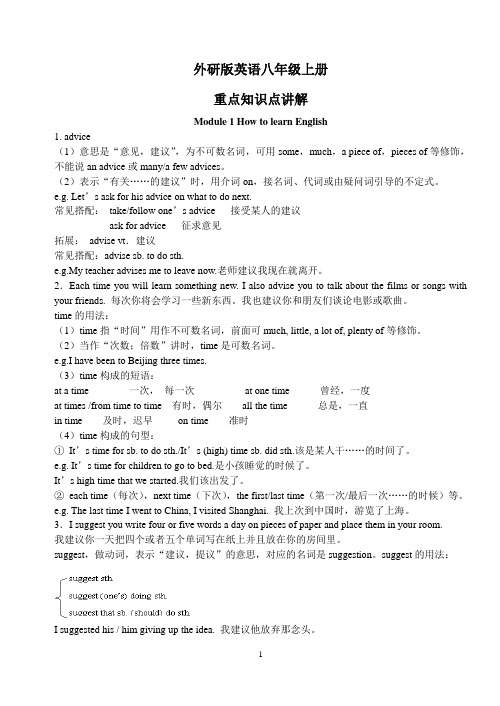
外研版英语八年级上册重点知识点讲解Module 1 How to learn English1. advice(1)意思是“意见,建议”,为不可数名词,可用some,much,a piece of,pieces of等修饰,不能说an advice或many/a few advices。
(2)表示“有关……的建议”时,用介词on,接名词、代词或由疑问词引导的不定式。
e.g. Let’s ask for his advice on what to do next.常见搭配:take/follow one’s advice接受某人的建议ask for advice 征求意见拓展:advise vt.建议常见搭配:advise sb. to do sth.e.g.My teacher advises me to leave now.老师建议我现在就离开。
2.Each time you will learn something new. I also advise you to talk about the films or songs with your friends. 每次你将会学习一些新东西。
我也建议你和朋友们谈论电影或歌曲。
time的用法:(1)time指“时间”用作不可数名词,前面可much, little, a lot of, plenty of等修饰。
(2)当作“次数;倍数”讲时,time是可数名词。
e.g.I have been to Beijing three times.(3)time构成的短语:at a time一次,每一次at one time曾经,一度at times /from time to time有时,偶尔all the time总是,一直in time及时,迟早on time准时(4)time构成的句型:①It’s time for sb. to do sth./It’s (high) time sb. did sth.该是某人干……的时间了。
Module 4 外研版英语八年级上册知识点背诵

Module 4◆重点词汇1.road n.路;(尤指)公路2.accident n.交通事故;意外事件3.except prep.除……之外4.choice n.选择a good choice一个不错的选择5.classmate n.同班同学6.far adj.远的;遥远的adv.远;遥远far away远离7.close adj.(距离上)近的,接近的adv.(距离上)接近地8.crowded adj.拥挤的;人数过多的get crowded 变得拥挤be crowded with...挤满了……9.journey n.旅行;旅程10.book v.预订book tickets订票11.park v.停放(车);泊(车)12.outside prep.在……之外adv.在外面;朝户外n.外面;外部adj.外部的;外表的13.however adv.然而;但是14.cost v.(cost)价钱为;花费n.价钱;成本;代价15.heavy traffic交通高峰期16.the same as 和……一样17.all the time一直;不断地18.a long time before提前很长时间19.cost as much as...和……花费一样多20.the second cheapest第二便宜的◆重点句型1.There was a road accident,and the traffic was very heavy.路上发生了一起事故,交通很拥堵。
2.It’s the most comfortable way,but it’s also the most expensive.这是最舒适的方式,但它也是最昂贵的。
3.He lives the farthest from school,so he takes the underground.他住得离学校最远,所以他乘地铁(上学)。
4.How long does the journey take and what is the best way to travel?旅途花多长时间,最好的出行方式是什么?5.The more information,the better.信息越多越好。
外研英语八年级上册Module 4Unit1(共19张PPT)

二:Describe(描写及原因):Betty goes to school by bus,
节 “辅音字母+ y ”结
词 尾的形容词,先把 y 变成 i,再加-est
大部分双
音节和多 在单词前加
音节单词 most
原级 fast, cheap, safe, close
big, hot,
busy, early
comfortable expensive
比较级 fastest, cheapest,
Work in pair(课文整合)
cheap
—How do you go to travel? ——II uussuuaallyllytrtarvaevl beyl btryai…n..It iIstthise tchheea…peests.t.
comfortable expensive
—How do you go to school? —I go to school byt_a_x_i___. It is the
she always walks.
4. For Betty, going to school by bike is t握本单元的重点单词 和重点词组: be far from,
be close to, be the same as,
二 学会规则形容词、副词的最高级 变化形式。
m__o_s_t_c_o_m__fo_r_t_a_b_le__way,but it’s also the _m__o_s_t_e_x_p_e_n_s_iv_e_____
外研版八年级上册Module 4知识点整理

外研版八年级上册Module 4知识点整理一.重点短语1.by bike 骑自行车2.far from远离3.closest离……近4. the same as和……一样5. because of因为6. all the time 一直:不断地7.get crowded变得拥挤8. have a great trip旅途愉快9.take a plane 乘飞机10.in a hurry 匆忙;急促.二.用法集萃1.plan to do sth.计划做某事.2.It takes sb. some time to do sth.做某事花费某人多长时间.3.sth.cost some money某物花费一些钱4.have to do sth必须做某事5.would like to do sth.想要做某事.6.It’s+形容词+to do sth.做某事是……的.7.the+比较级,the+比较级越……,越……三.重点句型1.What happened?发生什么了?2. He lives the farthest from school, so he takes the underground.他住得离学校最远,因此他坐地铁去。
3. What's the best way to get there? 到达那里的最佳方式是什么?4. And it takes you about twelve hours to get there.到那里大约花费你12个小时。
四.语法归纳:形容词副词的最高级(一)教材中含有形容词副词最高级的句子.1.It’s the most comfortable way, but it’s also the most expensive. 那是最舒服的方式,但也是最贵的。
2.He lives the farthest from school...他住得离学校最远……3.Her home is the closest to school...她的家离学校最近……(二)语法归纳1.形容词副词最高级的构成(A)规则变化。
外研版八年级上module4unit1ppt资料讲解

close adj. (距离上)近的;接近的 adv. (距离上)接近地
e.g. The church is close to the school. 教堂在学校附近。 They live quite close. 他们住得很近。
crowded adj. 拥挤的; 人数过多的
e.g. It is so crowded that there is not even stand room. 挤得几乎没有站立的地方。
I sometimes ____ school. I sometimes go to work ____.
fast faster
the fastest
How can we go to Shanghai?
¥ 38 the cheapest
¥ 54
¥ 120
the most expensive
Taking a bus is cheap.
Miss Liu’s home
Now complete the table.
Ways to go to school Betty
by bus
Tony Lingling Daming
Complete the sentences with the correct form of the words in the box.
4. I do not take the bus to school because it is usually very _________.
外研版八年级上 module4unit1ppt
except prep. 除……之外
e.g. I like every subject except math. 除了数学我每个学科都喜欢。
英语外研版八年级上Module4Unit1上课讲义
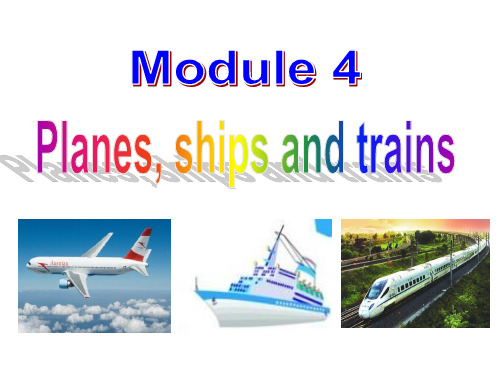
形容词和副词的最高级的不规则变化
原级 good/ well bad/ ill, badly many/ much
little far
最高级 best worst most least
farthest/ furthest
注意:在表示“A比B……”时,我们用A is … than B,但最高级表达的是三个及三个 以上的事物的比较状况,所以后面通常用 in/of/among… 来表示比较的范围。例如: Tom is the tallest in our class. Tony lives the closest to school of all my classmates.
7. btehaeumtifoustl bea→utiful
_m_o_s_t_c_a_r_e_f_u_ll_y_____
8. cwaroerfsutlly →
_m_o_s_t_____________
9. bleaadslty
→
_________________
farthest / furthest
— What’s the most expensive way to go
to school?
— Going by taxi is the most expensive.
Now complete the table.
Betty Tony Lingling Daming
Ways to go to school
10. much →
_________________
How do you often go to school?
Look at the pictures, and say something about the pictures.
外研版英语(新标准)八年级上册单元模块知识点归纳总结(全册)(完美版)
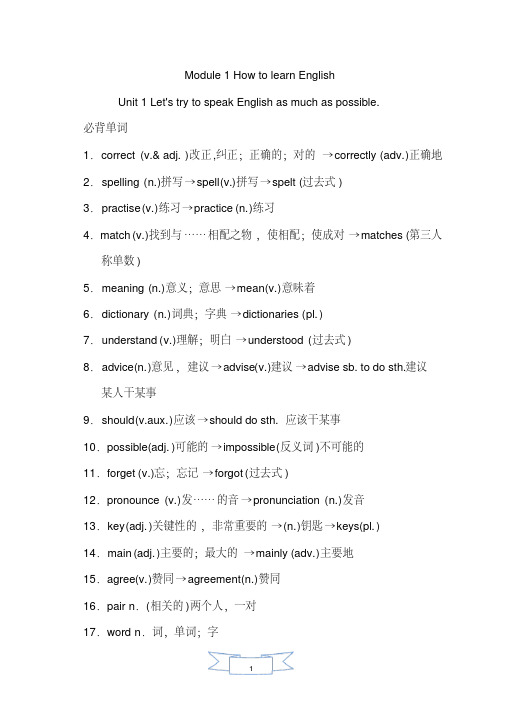
2020年最新
2. improve (v.)改进;改善 →improvement (n.)改进 3. time(n.)次,回→times(pl.) 4. shy(adj. )羞怯的;腼腆的 →shier(比较级 )→shiest(最高级 ) 5. quickly (adv.)快地;迅速地 →quick (adj. )快的;迅速的 6. natural adj. 合理的;合乎情理的 →nature (n.)自然界 7. suggest(v.)建议;提议 →suggestion(n.)建议 8.basic adj.主要的;基础的 9. conversationn. 谈话;交谈 10.place v.放置 必背短语 11.be afraid to do sth. 害怕干某事 12.smile at 朝……… 微笑 13.several times 几次 必背句子 14.Many studentsask for advice about how to improve their English.
许多学生询问关于如何提高他们英语的建议。 15.Watching films and listening to songs are great waysto learn English!
看电影和听歌曲是学英语很棒的方法! 16.I also advise you to talk about the films or songs with your friends.
mistakes. 并且不要忘了在错误的旁边写上正确答案。 30.It's a good ideato spell and pronounce new words aloud every day.
每天大声地拼读新单词是个好主意。 Unit 2 You should smile at her!
外研版英语八年级上册Module4-Unit1

他住得离学校最远。
I think … is the most popular.
It is the most comfortable way but it’s the most expensive.
学习并掌握询问交通方式及其回答的句型。
– How do you go to work?
far ---farther ---farthest
---How do you often go to school every day? ---I often go to school by bus every day .
---How does she go to school every day?
--- She walks to school. --- She goes to school on foot. 步行,走路
式。 3. Lingling is tall. 4. Daming is taller than Lingling. 5. Tony is the tallest of the three.
---How do you often go to school every day? ---I often go to school by bike every day.
Benz /bents /
Cadillac /'kædilæk /
I think … is the most expensive. the cheapest. the best. …
语法透析
形容词、副词的最高级
两者比较用形容词或副词的比较级,当我 们要将三个或以上的事物进行比较时,要用它 们的最高级。例如: 1. Lingling’s home is the closest to school. 玲玲
Module4Unit1知识点详解-广西桂林市雁山中学外研版八年级上册英语

外研版英语八(上)Module 4 Plays, ships, and trains知识点详解Unit 1He lives the farthest from school.★(A3).【知识点再现】I was late for school today. 今天我上学迟到了。
『知识点1』be late for意为“迟到”。
late是形容词,意为“迟到的”如:We’ll be late for work. 我们上班要迟到了。
Tony was late for the meeting yesterday afternoon. 托尼昨天下午开会迟到了。
★(A3).【知识点再现】What happened? 发生了什么事?『知识点2』happen是不及物动词,它的用法常见的有如下几种情况:①表示“某地(某时)发生了什么事”,常用“sth.+ happen +地点/时间”这一结构来表达,此时主语应是事物。
如:The story happened in 2003. 这个故事发生在2003年。
An accident happened in that street. 那条街上发生了一起事故。
②表示“某人出了某事(常指不好的事)”,要用“sth.+ happen+to sb.”这一结构来表达。
提问时常用“What happen(s)/happened to sb.?”句型。
如:What happened to you? 你怎么啦?A car accident happened to her this morning. 今天上午她发生了交通事故。
③表示“某人碰巧做某事”,要用“sb.+ happen+ to do sth.”这一结构来表达。
如:I happened to meet a friend of mine in the street yesterday. 昨天我碰巧在街上遇到了我的一个朋友。
④happen表示“碰巧或恰巧发生某事”时,还可用“It happens / happened that...”这一结构来表达。
初二英语上册(外研版)Module4 重点知识点

Module4 Planes, ships and trains.Unit1 He lives the farthest from school.一.重点单词1. road n.路;(尤指)公路2. accident n.交通事故;意外事件3. except prep. 除……之外4. choice n.选择→ choose v.选择5. classmate n.同班同学6. far adv.远;遥远adj.远的;遥远的【新义:adv.很大程度上;非常】7. close adj. (距离上)近的,接近的adv. (距离上)接近地【新义:adj.亲密的v.关;关闭】8. crowded adj.拥挤的;人数过多的→ crowd n.人群二.重点短语1. by taxi/underground/bus/ship/train 乘出租车/地铁/公共汽车/轮船/火车2. a good choice 一个不错的选择3. a bit/a little 一点;稍许4. so much 如此多5. most of… 大多数的……6. ride bikes 骑自行车7. go to school 上学8. far from 远离9. take the underground 坐地铁10. close to 离……近11. the same as 与……一样12. remember to do sth. 记得去做某事13. all the time 一直;不断地14. on one’s way to… 在去……的路上三.重点语法1.形容词、副词的最高级(1)概念:形容词的最高级用于三者或三者以上(人或物)的比较,形容词最高级前要用定冠词the,副词最高级前的the可以省略,后面常接of / in短语来说明比较的范围。
(2)变化规则①一般词尾加-est。
例:new→newest clean→cleanest①重读闭音节,单辅音字母双写加-est 例:big→biggest①辅音字母加y, 把y变i加-est。
- 1、下载文档前请自行甄别文档内容的完整性,平台不提供额外的编辑、内容补充、找答案等附加服务。
- 2、"仅部分预览"的文档,不可在线预览部分如存在完整性等问题,可反馈申请退款(可完整预览的文档不适用该条件!)。
- 3、如文档侵犯您的权益,请联系客服反馈,我们会尽快为您处理(人工客服工作时间:9:00-18:30)。
Module 4 Planes, ships and trains
Unit 1 He lives the farthest from school.
1.happen的用法
作为动词,意为“发生;碰巧”。
主要有以下用法:
(1)What happens/happened to sb.? 意为“某人怎么了?”其同义
句有What’s wrong/up with sb.?;What’s the matter/trouble with sb.?
Betty,you looked unhappy just now.What happened to you?
贝蒂,你刚才看起来很不开心。
发生什么事了?
(2)Sb.happens/happened to do sth.意为“某人碰巧做某事”,可
与“It happens/happened + that从句”相互转换。
翻译:刚才在我回家的路上,我正好碰到了我的一个朋友。
I happened to meet a friend of mine on my way home just now. = It happened that I met a friend of mine on my way home just now.
(3)拓展:辨析happen & take place
2.accident的用法
(1)作为可数名词,意为“交通事故;意外事件”。
A car accident happened to the old granny a moment ago.
就在不久前,那位老奶奶遭遇了车祸。
(2)常见固定搭配:
① traffic accident “交通事故”
Every year many traffic accidents happen because the drivers drive so carelessly.
每年由于驾驶人开车太过于粗心,导致了很多交通事故的发生。
②by accident “偶然地;意外地”
I met one of my good friends on my way to school by accident.
在我上学的路上,我偶然碰到了我的一个好朋友。
3.辨析:except & except for & besides & but
4.辨析:maybe & may be
5.choice的用法
(1)作为名词,意为“选择”。
常用于以下表达中:
①make a choice “做出选择”
It’s time for us to make a choice.到了我们做出选择的时候了。
②have no choice but to do sth. “除了做某事外别无选择”
I had no choice but to wait for the next train.
除了等待下一班火车之外我没有其它选择。
(2)其动词是choose,意为“选择”,其过去式和过去分词分别是chose和chosen。
常用于以下表达中:
①choose (sb.)to do sth.,意为“选择(某人)做某事”。
We chose Tom to work on the project.我们选择汤姆去完成这个项目。
②choose sb.sth.= choose sth.for sb.即choose后接双宾语,意为“为某人挑选某物”。
The little girl chose her mother a nice present.
= The little girl chose a nice present for her mother.
这个小女孩儿给妈妈选了一件精美的礼物。
③choose sb. as + 职务 = choose sb. to be + 职务
We chose Tom as our PE monitor.
=We chose Tom to be our PE monitor.
我们选汤姆当我们的体育班长/委员。
6.far的用法
(1)作为形容词,意为“远的;遥远的”。
常用于be far from,意为“离……遥远”。
My home is far from my school.我家离学校很远。
(2)作为副词,意为“远;遥远”。
常用于live far from,意为“住得离……遥远”。
Mr Zhang lives far from his school.张老师住得离学校很远。
7.close的用法
(1)作为形容词,意为“(距离上)近的;(关系方面)亲密的”。
My home is close to a supermarket. 我家离一家超市很近。
I have a close friend called Jack.我有一位叫做杰克的密友。
(2)作为副词,意为“(距离上)接近地”。
Don’t stand too close.别站得太近。
(3)作为及物动词,意为“关闭;关”。
Would you please close the door behind you?
能够请您把身后的门关上吗?
8.crowded的用法
(1)作为形容词,意为“拥挤的;人数过多的”。
常用于be crowded with,意为“挤满”。
The bus is crowded with passengers.这班公交车上挤满了乘客。
(2)其动词和名词均为crowd,常用于a crowd of,意为“一群
(人)”。
A crowd of people gathered around the swimming pool. 一群人聚集在游泳池周围。
9.all the time的用法
其意为“一直;总是”,相当于always。
He is working hard all the time.他一直努力地在工作。
